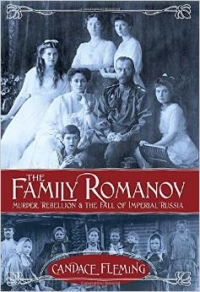Title: The Family Romanov
Author: Candace Fleming
Publisher: Schwartz & Wade
ISBN: 978-0375867828
Pages: 304
Genre: Young Adult
Synopsis
I have always been a storyteller. Even before I could write my name, I could tell a good tale. And I told them all the time. As a preschooler, I told my neighbors all about my three-legged cat named Spot. In kindergarten, I told my classmates about the ghost that lived in my attic. And in first grade I told my teacher, Miss Harbart, all about my family’s trip to Paris, France.
I told such a good story that people always thought I was telling the truth. But I wasn’t. I didn’t have a three-legged cat or a ghost in my attic, and I’d certainly never been to Paris, France. I simply enjoyed telling a good story… and seeing my listener’s reaction.
Sure, some people might have said I was a seven-year old fibber. But not my parents. Instead of calling my stories “fibs” they called them “imaginative.” They encouraged me to put my stories down on paper. I did. And amazingly, once I began writing, I couldn’t stop. I filled notebook after notebook with stories, poems, plays. I still have many of those notebooks. They’re precious to me because they are a record of my writing life from elementary school on.
In second grade, I discovered a passion for language. I can still remember the day my teacher, Miss Johnson, held up a horn-shaped basket filled with papier-mache pumpkins and asked the class to repeat the word “cornucopia.” I said it again and again, tasted the word on my lips. I tested it on my ears. That afternoon, I skipped all the way home from school chanting, “Cornucopia! Cornucopia!” From then on, I really began listening to words–to the sounds they made, and the way they were used, and how they made me feel. I longed to put them together in ways that were beautiful, and yet told a story.
As I grew, I continued to write stories. But I never really thought of becoming an author. Instead, I went to college where I discovered yet another passion–history. I didn’t realize it then, but studying history is really just an extension of my love of stories. After all, some of the best stories are true ones — tales of heroism and villainy made more incredible by the fact they really happened.
After graduation, I got married and had children. I read to them a lot, and that’s when I discovered the joy and music of children’s books. I simply couldn’t get enough of them. With my two sons in tow, I made endless trips to the library. I read stacks of books. I found myself begging, “Just one more, pleeeeease!” while my boys begged for lights-out and sleep. Then it struck me. Why not write children’s books? It seemed the perfect way to combine all the things I loved: stories, musical language, history, and reading. I couldn’t wait to get started.
But writing children’s books is harder than it looks. For three years I wrote story after story. I sent them to publisher after publisher. And I received rejection letter after rejection letter. Still, I didn’t give up. I kept trying until finally one of my stories was pulled from the slush pile and turned into a book. My career as a children’s author had begun.
For more information visit my website: www.candacefleming.com.




Follow Us